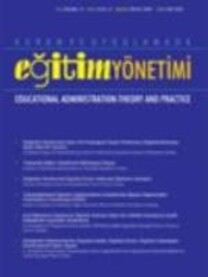İngilizce Hazırlık Öğrencilerinin Özbelirleyicilik Düzeylerinin Çeşitli Değişkenlere Göre İncelenmesi (İnönü Üniversitesi Örneği)
motivasyon , özbelirleyicilik , &ingilizce öğretimi
Analyzing the Self-Determination Levels of English Prep Students by Some Variables (Inönü University Case)
motivation , self-determination , teaching english.,
___
- Açıkgöz, K.Ü. (2003). Etkili öğrenme ve öğretme. İzmir: Eğitim Dünyası Yayınları.
- Altan , M.Z. (1994). Relationships between foreign language aptitude, attitudes, motivations and the attained English language. Yayınlanmamış Doktora tezi, Çukurova Üniversitesi,
- Sosyal Bilgiler Enstitüsü, Adana.
- Chang, H.H. (2005). The relationship between extrinsic/intrinsic motivation and language learning strateges among the college students of English in Tawian. Yayınlanmamış Yüksek Lisans Tezi, Ming Chuan University, College of Applied Languages, Department of Applied English, Tayvan.
- Clement, R., & Kruidenier, B. (1983). Orientations on second language acquisition: The effects of ethnicity, milieu and their target language on their emergence. Language Learning, 33, 273–291.
- Deci, E.L., Vallerand, R.J., Pelletier, L.G. & Ryan, R.M. (1991). Motivation and education: The self-determination perspective. Motivation and Education. 26(3&4), 325-346
- Deci, E.L. & Ryan, R.M. (1985). Intrinsic motivation and self-determination in human behavior. New York: Plenum Press.
- Demirel, Ö. (2003). Yabancı dil öğretimi. Ankara: PegemA Yayıncılık.
- Dörnyei, Z. (1994). Motivation and motivating in the foreign language classroom. Modern Language Journal, 78(3), s. 273-284.
- Dörnyei, Z. (2005). The psychology of the language learner: Individual differences in second language acquisition. London: Lawrance Erlbaum Associates.
- Duy, B. (2007). Güdülenme ve bireysel farklılıklar. Alim Kaya (Editör), Eğitim psikolojisi (s 587-637). Ankara: PegemA Yayıncılık.
- Harmer, J. (2007). The practice of english language teaching. England: Pearson Longman Publication.
- Gardner, R.C. (1985). Social psychology and second language learning: The role of attitudes and motivation. London: Edward Arnold.
- Gardner, R.C. (1988). The socio-educational model of second language learning: Assumptions, findings, and issues. Language Learning, 38, 101-126.
- Gardner, R.C. and Lambert, W.E. (1972) Attitudes and motivation in second language learning. Rowley, MA: Newbury House.
- Gardner, R. C., Smythe, P. C. & Clement, R. (1979). Intensive second language study in a bicultural milieu: An investigation of attitudes, motivation and language proficiency. Language Learning, 29, 305-320.
- İnönü Üniversitesi (2007). 2007-2008 eğitim öğretim yılı öğrenci kılavuzu. Malatya: İnönü Üniversitesi.
- Kraemer, R. (1993). Social psychological factors related to the study of Arabic among Israeli high-school students: A test of Gardner's socio-educational model. Studies in Second Language Acquisition, 15(1), 83-100.
- Maslow, A.H. (1987). Motivation and personality. New York: Harper&Row, Publishers, Inc.
- McIntosh, C.N. & Noels, K.A. (2004). Self-determined motivation for language learning: The role of need for cognition and language learning strategies. Zeitschrift für Interkulturellen Fremdsprachenunterricht, 9(2), 28.
- Noels, K.A., Clément, R., & Pelletier, L.G. (1999). Perceptions of teachers' communicative style and students' intrinsic and extrinsic motivation. Modern Language Journal, 83(1), 24-34.
- Noels, K. A., Pelletier, L.G., Clément, R., & Vallerand, R.J. (2000). Why are you learning a second language? Motivational orientations and self-determination theory. Language Learning, 50(1), 57-85.
- Rueda, R. & Chen, C.B. (2005). Assessing motivational factors in foreign language learning: cultural variation in key constructs. Educational Assessment, 10(3), 209-229.
- Sarıeyüpoğlu, D. (2001). An evaluation of students’ attitudes and motivation towards English as a foreign language (F.U. Technical education Faculty Sample). Yayınlanmamış Yüksek Lisans Tezi, Fırat Üniversitesi, Sosyal Bilimler Enstitüsü, İngiliz Dili ve Edebiyatı Bölümü, Elazığ.
- Senemoğlu, N. (2005). Gelişim öğrenme ve öğretim. Ankara: Gazi Kitapevi.
- Skehan, P. (1989). Individual diferences in second-language learning. London: Edward Arnold, 1989.
- Slavin, R.E. (2000). Educational psychology. London: Pearson Education Company.
- Vallerand, R.J. (1997). Toward a hierarchical model of intrinsic and extrinsic motivation. Mark P. Zanna (Editör), Advances in experimental social psychology (29. Baskı) (s. 271-360). San Diego, CA: Academic Press.
- Vallerand, R.J. (2000). Deci and Ryan's self-determination theory: A view from the hierarchical model of intrinsic and extrinsic motivation. Psychological Inquiry, 11(4) 312-318.
- Vallerand, R. J., Pelletier, L.G., Blais, M.R., Brière, N.M., Senécal, C. & Vallières, E.F. (1992). The academic motivation scale: A measure of intrinsic, extrinsic, and amotivation in education. Educational and Psychological Measurement, 52(4), 1003- 1017.
- Vallerand, R.J., Pelletier, L.G., Blais, M.R., Brière, N.M., Senécal, C., & Vallières, E.F. (1993). On the assessment of intrinsic, extrinsic, and amotivation in education: Evidence on the concurrent and construct validity of the Academic Motivation Scale. Educational and Psychological Measurement, 53(1), 159-172.
- Wikipedia (2008) http://en.wikipedia.org/wiki/Motivation
- Williams, M. (1994). Motivation in foreign and second language learning: An interactive perspective. Educational and Child Psychology, 11(2), 77-84.
- Williams, M. & Burden, R.L. (1997). Psychology for language teachers: A social constructivist approach. Cambridge: Cambridge University Press.
- Wlodowsky, R.J. (1999). Enhancing adult motivation to learn. San Fransico: Jossey- Bass Inc.
- Yağcıoğlu, D. (1994). An Explatory Study of the relasinship between instrumental and integrative motivation and socio-economic background of Turkish EFL students. Yayınlanmamış Yüksek Lisans Tezi, İngilizce Öğretmenliği Bölümü, Bilkent Üniversitesi, Ankara.
- Yalçın, H. (2005). Factors that affect the motivational level of English preparatory class students studying at Gazi University. Yayınlanmamış Yüksek Lisans Tezi, İngilizce Öğretmenliği Bölümü, Gazi Üniversitesi, Ankara.
- ISSN: 1300-4832
- Yayın Aralığı: 4
- Başlangıç: 1995
- Yayıncı: Pegem Akademi Yayıncılık Eğitim Danışmanlık Hizmetleri Tic. Ltd. Şti.
SÜLEYMAN NİHAT ŞAD, OĞUZ GÜRBÜZTÜRK
İlköğretim Okullarında Verilere Dayalı Karar Verme
Okul Yöneticilerinin Yalnızlık ve Yaşam Doyum Düzeylerinin İncelenmesi
MAKBULE BAŞBAY, GÜLSEN ÜNVER, Nilay T. BÜMEN
Üniversite Adaylarının ÖSYS Tercihlerinde Kullandıkları Karar Verme Stratejileri
